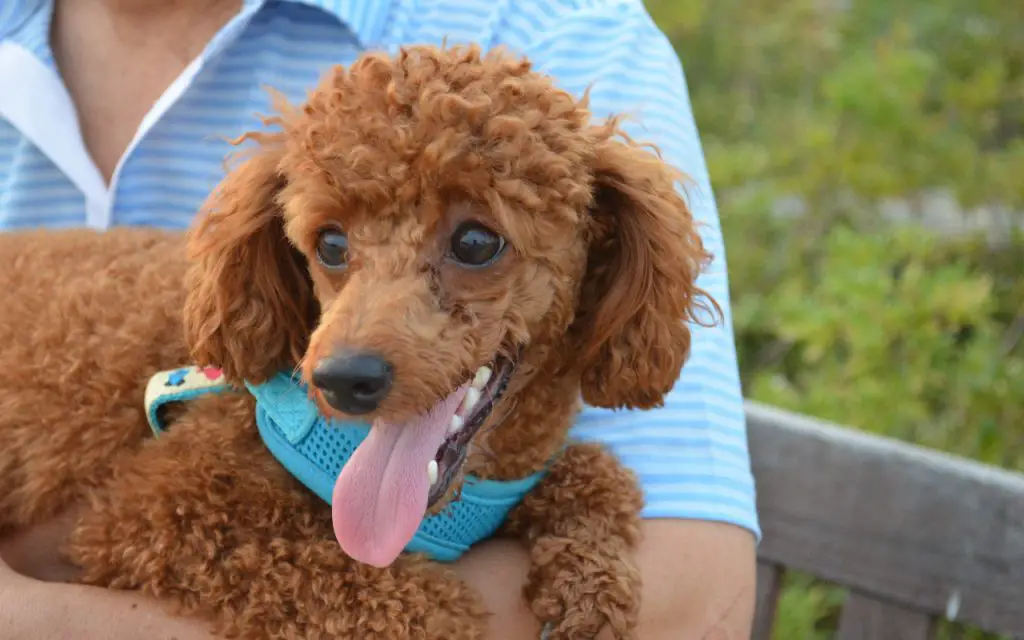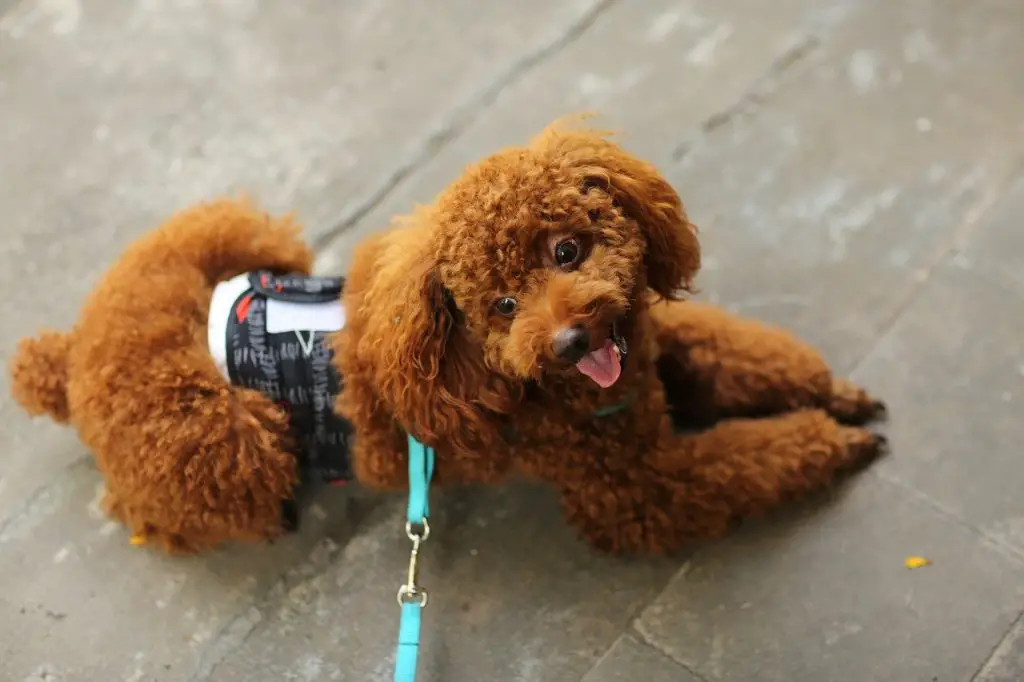There’s no getting around it – your toy poodle needs to poop! But how often should he do it? And how can you make sure that his bowel movements are healthy and regular?
In this blog post, we’ll answer these questions and more. So read on to learn everything you need to know about your toy poodle’s bathroom habits!
Key Takeaway
- A healthy Toy Poodle should poop at least once to twice a day, but the frequency can vary based on diet, age, and overall health.
- Your toy poodle may poop excessively due to various factors such as bacterial infection, overfeeding, a low-quality diet, sudden changes in diet, stress or age-related issues, and parasites.
- You can regulate your dog’s poop by maintaining a consistent, high-quality, fiber-rich diet, ensuring proper hydration, providing regular exercise, avoiding sudden changes in diet or overfeeding, and scheduling regular vet check-ups.
How Many Times a Day Should a Toy Poodle Poop?

A toy poodle should poop between one and five times a day. If your toy poodle is pooping more or less than that, you’ll want to adjust its diet or take them to the vet. Excessive pooping can be a sign of a health problem.
On the other hand, if your toy poodle isn’t pooping at all, that’s also a sign of trouble and you’ll want to get them checked out by a vet.
In general, smaller dogs tend to poop more often than larger dogs. This is because they have a higher metabolic rate and burn more calories per day than their larger counterparts. So if you’re wondering whether a toy poodle poops more than a golden retriever, the answer is probably yes!
Small dogs like toy poodles tend to poop more because their bodies have a harder time digesting food. This means that they have to expel waste more often in order to rid their systems of toxins.
Additionally, these little dogs usually eat more than their larger counterparts, putting even more strain on their digestive systems. So while it may be frustrating when your toy poodle leaves a mess on the floor, remember that he’s just trying to take care of his health!
If your toy poodle is having trouble pooping, there are some things you can do to help them out. One thing that might help is increasing their water intake. Another thing you can do is make sure they’re getting enough fiber in their diet.
You can also try giving them a little bit of pumpkin or applesauce, which are natural laxatives. If all of that fails, you might want to consider taking your toy poodle to the vet for a check-up.
Why Does My Toy Poodle Poop So Much?

Your toy poodle might be pooping so much due to factors like overeating, a low-quality diet, bacterial infection, stress, age-related issues, or a sudden change in diet.
Bacteria
Bacterial infections can cause excessive pooping in dogs. The bacteria can disrupt the digestive system, leading to frequent bowel movements. If your toy poodle shows symptoms like diarrhea or bloody stools along with increased frequency of pooping, it might have a bacterial infection.
Too Much Food
Overeating can also lead to excessive pooping. If your toy poodle is eating more than its daily recommended portion, it may result in increased bowel movements. It’s important to feed your dog the right amount of food according to its weight, age, and activity level.
Low-Quality Diet
A low-quality diet can result in your toy poodle pooping more than usual. Some dog foods contain fillers and low-quality ingredients that can’t be fully digested, resulting in larger and more frequent stools. Feeding your toy poodle high-quality, easily digestible food can help reduce the frequency of bowel movements.
Sudden Change in Diet
A sudden change in diet can upset your toy poodle’s digestive system, leading to increased pooping. It’s recommended to gradually introduce new food over a period of 7-10 days to allow your dog’s digestive system to adjust.
Stress and Age-Related Issues
Stress and age-related issues can also affect your toy poodle’s pooping habits. Dogs can experience stress from changes in their environment, which can lead to digestive issues and increased defecation. Older dogs may also poop more due to changes in their metabolism and digestive health.
Parasites
Parasites such as worms can cause excessive pooping in dogs. If your toy poodle has worms, it may show symptoms like diarrhea, weight loss, and increased appetite along with frequent bowel movements. Regular deworming can help prevent this issue.
Is it OK if My Dog Only Poops Once a Day?
A healthy dog should have one bowel movement a day. However, there are some factors that could influence this number. For example, if your dog only eats once a day, they may only need to go once a day.
Conversely, if your dog is eating multiple times per day and not getting enough exercise, they may go more than once.
The best way to figure out how many times your specific dog needs to go is to watch their habits and adjust accordingly. If they’re straining or having trouble going, then they may need more help getting regular.
Many factors have to be taken into consideration when it comes to deciding the ”healthy” frequency of pooping in dogs. The first factor is diet. Puppies who are eating a healthy diet will likely poop more regularly than those who are not.
The second factor is age. Younger puppies will usually poop more frequently than older puppies. And finally, the size of the dog can also play a role in how often it poops. Smaller breeds will typically poop more often than larger breeds of poodles.
Generally speaking, however, once a day is generally acceptable for most dogs. Puppies typically need to poop more often than adult dogs, while senior dogs may only need to go once a day or even less frequently.
You’ll also want to take into account how much your dog is eating and whether they’re getting enough exercise – if they’re not pooping regularly after eating or going for walks, you may need to adjust their diet or activity level.
How Can I Regulate My Dog’s Poop?
You can regulate your dog’s poop by maintaining a consistent diet, providing regular exercise, ensuring sufficient hydration, and scheduling regular vet check-ups.
Consistent Diet
A consistent, high-quality diet is key to regulating your dog’s poop. Feed your dog the same food each day and avoid sudden changes in diet. High-quality dog food that is easily digestible and rich in fiber can result in regular and firm stools. Avoid giving your dog table scraps or foods that can upset its stomach.
Regular Exercise
Regular exercise can help stimulate your dog’s digestive system and promote regular bowel movements. Make sure your dog gets plenty of physical activity each day through walks, playtime, or other forms of exercise.
Hydration
Proper hydration is essential for healthy digestion in dogs. Make sure your dog always has access to fresh, clean water. Dehydration can lead to constipation and other digestive issues, so it’s important to keep your dog well-hydrated.
Regular Vet Check-ups
Regular vet check-ups can help ensure your dog’s digestive health is on track. Your vet can check for any underlying health issues that might be causing irregular pooping and provide appropriate treatment. They can also provide advice on feeding and exercise to help regulate your dog’s poop.
Avoid Overfeeding
Overfeeding can lead to excessive pooping and digestive issues in dogs. Make sure you’re feeding your dog the right amount based on its weight, age, and activity level. If you’re unsure about how much to feed your dog, consult with your vet says PawSafe.
FAQs
Q: What is considered normal poop frequency for a toy poodle?
A: A normal poop frequency for a toy poodle is once or twice a day.
Q: Why is it important to monitor a toy poodle’s poop frequency?
A: Monitoring a toy poodle’s poop frequency is important because it can indicate the health of their digestive system.
Q: What are the factors that can affect a toy poodle’s poop frequency?
A: Factors such as diet, exercise, and overall health can affect a toy poodle’s poop frequency.
Q: Can a toy poodle poop more than twice a day?
A: Yes, a toy poodle can poop more than twice a day if they have a higher fiber diet or if they have gastrointestinal issues.
Q: Can a toy poodle poop less than once a day?
A: Yes, a toy poodle can poop less than once a day if they have a low-fiber diet or if they are experiencing constipation.
Q: What should I do if my toy poodle is not pooping regularly?
A: If your toy poodle is not pooping regularly, it is important to consult with a veterinarian to rule out any underlying health issues.
Q: Are there any signs of a healthy poop for a toy poodle?
A: Yes, a healthy poop for a toy poodle should be well-formed, brown in color, and not too hard or too soft.
Q: Are there any signs of digestive issues in a toy poodle’s poop?
A: Yes, signs of digestive issues in a toy poodle’s poop can include diarrhea, excessive gas, or the presence of blood or mucus.
Conclusion and final thoughts
In conclusion, when it comes to how often a toy poodle should poop, there is no one-size-fits-all answer.
Depending on its diet and lifestyle, your pet may need to go several times a day or only once in a couple of days.
It is important to monitor their pooping habits closely and consult with a veterinarian if you notice any changes in their bowel habits.




